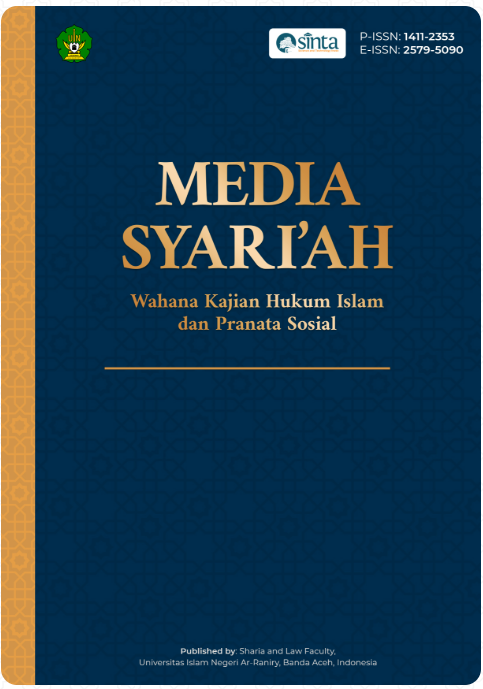Dewas' Legal Effects on KPK Independence: A View from Siyasah Dusturiyyah
DOI:
https://doi.org/10.22373/jms.v25i1.17801Keywords:
Dewan Pengawas, Independensi KPK, Siyasah Dusturiyyah.Abstract
This article says that the Supervisory Board's (Dewas) main job is to keep an eye on how the Corruption Eradication Commission (KPK) is doing. This includes making performance goals, managing the budget, and keeping an eye on wiretapping and searches done by the KPK. The goal of this paper is to explain, from the point of view of Siyasah Dusturiyyah, how the presence of the Supervisory Board in Law No. 30 of 2002 about the KPK affects the independence of the KPK. In this study, normative legal research was used. For this study, library research was used to find legal information. Based on the results of this study, Siyasah Dusturiyyah thinks that the presence of the Supervisory Board has a positive effect on the independence of the KPK. The Supervisory Board is an independent body that makes sure the KPK follows the law and isn't affected by political or other groups' interests.
Artikel ini berusaha menegaskan tugas utama Dewan Pengawas (Dewas) adalah mengawasi bagaimana kinerja Komisi Pemberantasan Korupsi (KPK). Hal ini termasuk menetapkan sasaran kinerja, mengelola anggaran, dan mengawasi penyadapan dan penggeledahan yang dilakukan oleh KPK. Tulisan ini bertujuan untuk menjelaskan, dari sudut pandang Siyasah Dusturiyyah, bagaimana keberadaan Dewan Pengawas dalam UU No. 30 Tahun 2002 tentang KPK mempengaruhi independensi KPK. Dalam penelitian ini digunakan penelitian hukum normatif. Berdasarkan hasil kajian tersebut, Siyasah Dusturiyyah menilai kehadiran Dewan Pengawas berpengaruh positif terhadap independensi KPK. Dewan Pengawas adalah badan independen yang memastikan KPK taat hukum dan tidak terpengaruh oleh kepentingan politik atau kelompok lain.
References
Ariana, R. (2016). Laporan Kinerja Ombudsman Republik Indonesia. 1–23.
Dan, T., Siyasah, F., Islam, A., & Iai, A. I. (2022). Urgensi Dewan Pengawas Komisi Pemberantasan Korupsi ( Dewas Kpk ) Menurut Undang-Undang Nomor. 1(4), 733–742.
Gusmansyah, W. (2019). Trias Politica Dalam Perspektif Fikih Siyasah. Al Imarah : Jurnal Pemerintahan Dan Politik Islam, 2(2), 123–134. https://doi.org/10.29300/imr.v2i2.1448
Habibi, M. (2020). Independensi Kewenangan Komisi Pemberantasan Korupsi Pasca Perubahan Undang-Undang Komisi Pemberantasan Korupsi. Cepalo, 4(1), 41–54. https://doi.org/10.25041/cepalo.v4no1.1962
Hajati, S. (2019). Buku Ajar Pengantar Hukum Indonesia - Google Books. Airlangga University Press.
Hikmah, N. F. (2020). Keberadaan Dewan Pengawas Terhadap Independensi Komisi Pemberantasan Korupsi Perspektif Siyasah Dusturiyah. Al-Balad: Journal of Constitutional Law, 2(2), 17. http://urj.uin-malang.ac.id/index.php/albalad/article/view/595
Indrayana, D. (2017). Jangan bunuh KPK - Google Books. Adamssein Media. https://www.google.co.id/books/edition/Jangan_Bunuh_KPK/UR-vDgAAQBAJ?hl=id&gbpv=1&dq=Indrayana,+D.+(2016).+Jangan+Bunuh+KPK.+Malang:+Intrans+Publishing&pg=PR2&printsec=frontcover
Mukhti Fajar, & Achmad, Y. (2015). Dualisme Penelitian Hukum Normatif dan Empiris. 8(1), 15–35.
Mutiara. (2017). Prinsip Dasar Hukum Politik Islam Dalam Perspektif Al-Quran. Petita: Jurnal Kajian Ilmu Hukum Dan Syariah, 2(1). https://doi.org/10.22373/petita.v2i1.59
Pramono, D. W. (2022). KOMPENDIUM UNDANG2 UNTUK PENEGAK HUKUM Buku-3 - Google Books. Penerbit Alumni.
Romansyah, A. (2020). Upaya Pencegahan Korupsi - Google Books. Pustaka Rumah C1nta.
Susiani, D. (2019). Buku Ajar Hukum Administrasi Negara - Google Books. Pustaka Abadi.
Downloads
Published
Issue
Section
License
MEDIA SYARI'AH: Wahana Kajian Hukum Islam dan Pranata Sosial has CC-BY-SA or an equivalent license as the optimal license for the publication, distribution, use, and reuse of scholarly work. Authors who publish with this journal agree to the following terms:
1. Authors retain copyright and grant the journal right of first publication with the work simultaneously licensed under a Creative Commons Attribution-ShareAlike 4.0 International License that allows others to share the work with an acknowledgment of the work's authorship and initial publication in this journal.
2. Authors are able to enter into separate, additional contractual arrangements for the non-exclusive distribution of the journal's published version of the work (e.g., post it to an institutional repository or publish it in a book), with an acknowledgment of its initial publication in this journal.
3. Authors are permitted and encouraged to post their work online (e.g., in institutional repositories or on their website) prior to and during the submission process, as it can lead to productive exchanges, as well as earlier and greater citation of published work (See The Effect of Open Access).
You are free to:
Share — copy and redistribute the material in any medium or format.
Adapt — remix, transform, and build upon the material for any purpose, even commercially.
The licensor cannot revoke these freedoms as long as you follow the license terms.
All papers published in MEDIA SYARI'AH: Wahana Kajian Hukum Islam dan Pranata Sosial are licensed under a Creative Commons Attribution-ShareAlike 4.0 International License.




.png)


.png)
.png)
.png)



